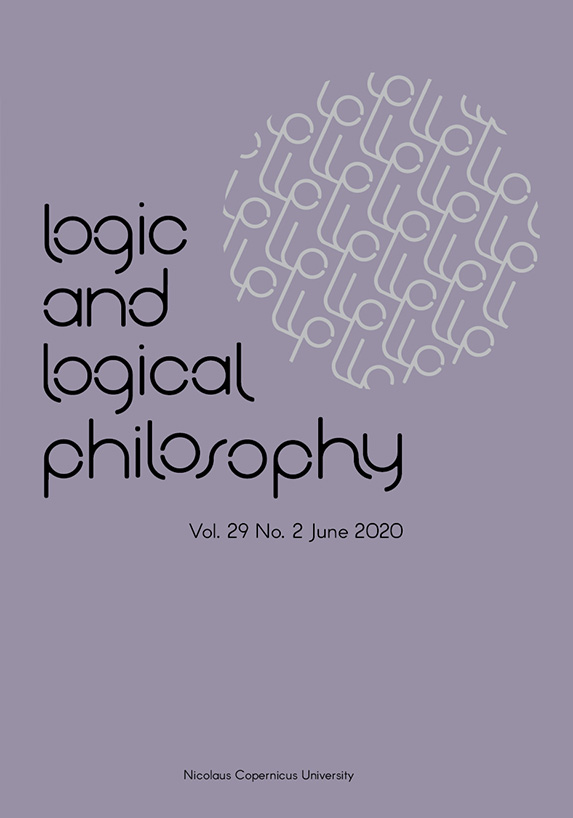Explicit Conditionals in the Framework of Classical Conditional Logic
DOI:
https://doi.org/10.12775/LLP.2019.030Słowa kluczowe
indicative conditionals, counterfactual conditionals, modality, transitivity of conditionals, centering conditionAbstrakt
The paper proposes a first approach to systems whose language includes two primitives (>+ and >-) as symbols for factual and counterfactual conditionals which are explicit, i.e. that are stated jointly with the truth or falsity of the antecedent clause. In systems based on this language, here called 2-conditional, the standard corner operator may be defined by (Def>) A > B := (A >+ B)∨(A >- B), while in classical conditional systems one could introduce the two symbols for explicit conditionals by the definitions (Def>+) A >+ B := A∧(A>B) and (Def>-) A>- B := ¬A∧(A>B). Two 2-conditional systems, V² and VW², are axiomatized and proved to be definitionally equivalent to the monoconditional systems V and VW. A third system VWTr² is characterized by an axiom stating the transitivity of factual conditionals and is shown to be distinct from V², from VW² and from the 2-conditional version of Lewis’ well-known system VC, here named VC². The same may be said for a fourth system VW²◊ ±, based on an axiom inderivable in VC²: ◊(A >+ B) ⊃ ◊( ¬A >- ¬B). VC² contains what is here called a “semi-collapse” of the operator >+ and it is argued that it is inadequate as a logic for both factual and counterfactual conditionals. The last section shows that several different definitions of the corner operators in terms of >+ and >- may be introduced as an alternative to (Def>).
Bibliografia
Arlò-Costa, I., 2007, “The logic of conditionals”, in Stanford Encyclopedia of Philosophy, https://plato.stanford.edu/entries/logicconditionals/.
Corcoran, John, 1993, “Meanings of implication”, Dialogos 9, 1973: 59–76.
Reprinted in R. Hughes (ed.), Philosophical Companion to First Order Logic, Indianapolis: Hackett, 1993.
Edgington, D., 2014, “Indicative conditionals” in Stanford Encyclopedia of Philosophy, https://plato.stanford.edu/entries/conditionals/.
Goodman, N., 1947, “The problem of counterfactual conditionals”, Journal of Philosophy 44: 113–128.
Gundersen, L., 2004, “Outline of a new semantics for counterfactuals”, Pacific Philosophical Quarterly 85 (1): 1–20. DOI: http://dx.doi.org/10.1111/j.1468-0114.2004.00184.x
Lewis, D.K., 1971, “Completeness and decidability of three logics of counterfactual conditionals”, Theoria 37: 74–85
Lewis, D.K., 1973, Counterfactuals, Oxford: Blackwell.
Nute, D., 1980, Topics in Conditional Logic, Dordrecht: Reidel. DOI: http://dx.doi.org/10.1007/978-94-009-8966-5
Pizzi, C., 1980, “‘Since’, ‘Even if’, ‘As if’”, pages 73–87, chapter 6, in M.L. Dalla Chiara (ed.), Italian Studies in the Philosophy of Science, Studies in the Philosophy of Science, vol. 47, Reidel, Dordrecht. DOI: http://dx.doi.org/10.1007/978-94-009-8937-5_6
Pizzi, C., 2013, “Counterfactuals and Modus Tollens in abductive arguments”, Logic Journal of the IGPL 21 (6): 962–979. DOI: http://dx.doi.org/10.1093/jigpal/jzt014
Pollock, J.L., 1975, “Four kinds of conditionals”, American Philosophical Quarterly 1: 51–59.
von Kutschera, F., 1974, “Indicative conditionals”, Theoretical Linguistics 1 (1–3): 257–269. DOI: http://dx.doi.org/10.1515/thli.1974.1.1-3.257
von Kutschera, F., 1974, “Indicative conditionals”, Theoretical Linguistics 1 (1–3): 257–269. DOI: http://dx.doi.org/10.1515/thli.1974.1.1-3.257
Pobrania
Opublikowane
Jak cytować
Numer
Dział
Statystyki
Liczba wyświetleń i pobrań: 906
Liczba cytowań: 0







